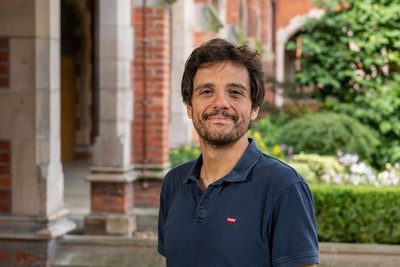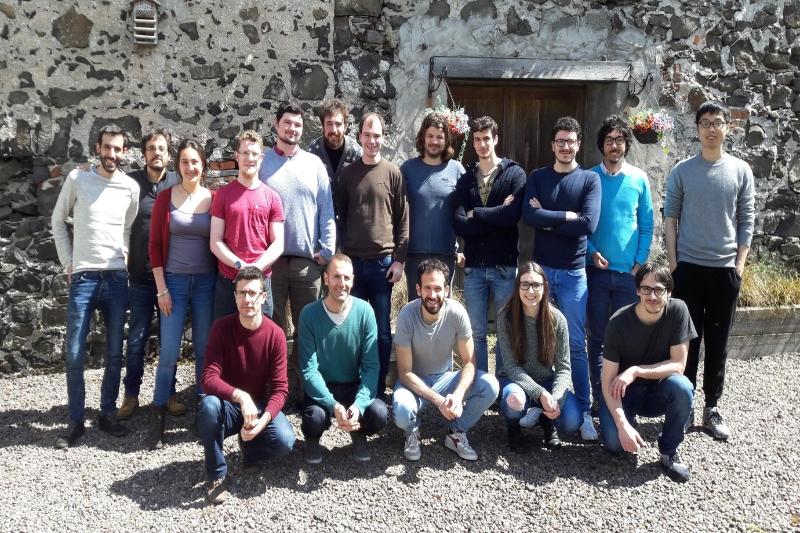Quantum Technology
Professor Mauro Paternostro - RS Wolfson Fellow
Quantum information science & quantum technologies
 Information technology (IT) is shaping our society in a truly fundamental way, akin to what the industrial revolution did nearly three centuries ago.
Information technology (IT) is shaping our society in a truly fundamental way, akin to what the industrial revolution did nearly three centuries ago.
The fastgrowing need to communicate and process information pushes the development of faster and more powerful IT devices. Our need for mobility requires them to be ever more portable, small, and light.
Such a race towards miniaturisation is leading us to the possibility to engineer and realise logical gates – the building blocks of CMOS- based electronics – based on the working principles of elementary constituents of matter like single atoms, or ultra-low intensity light.
When information is encoded in and processed by such simple carriers, the laws of quantum mechanics become predominant: Enter the domain of quantum technologies, where counterintuitive phenomena entailed by the quantum superposition principle enable unrivalled computational power, unbreakable communication security, and exquisite sensing capabilities.
The Quantum Technology group at Queen’s pushes the boundary of quantum information processing and quantum technologies by exploring the potential benefits of quantum resources, investigating the impact of energy-exchange processes at the fundamental quantum level, and designing protocols for the harnessing of quantum parallelism for computational purposes.
Led by Gabriele De Chiara, Alessandro Ferraro, and Mauro Paternostro, QTeQ investigates frontier topics such as quantum machine learning, the foundations of quantum theory and the thermodynamics of quantum processes. The group is a major player in the race to push quantum technologies all the way up to space applications for the construction of a genuine quantum internet leveraging existing satellite-based technologies, and a pioneer in the use of information theoretic approaches to the exploration of quantum gravity.
The performance of current IT devices and architectures is limited by energy consumption and heating: we have all experienced how hot the case of a laptop becomes when the CPU operates, and a core need of High-Performance Computing hubs is the availability of efficient cooling mechanisms for the machines.
QTeQ members study the fundamental processes that regulate the exchange of energy among information carriers in quantum IT systems, which is the core aim of the emerging field of quantum thermodynamics. The work done by the group by is contributing to the development of new quantum technologies that process information in a more energy efficient manner than any classical counterpart. At the same time, this research will help the emerging framework of quantum technologies to establish the energetic footprint of upcoming quantum computers and communication systems based on quantum mechanics. This holds the potential for achieving impact at all levels, from society to economy.
It is in such a tantalising environment that the research performed by QTeQ is placed. The group performs world-class theoretical studies that are published in leading international journals – from Nature Photonics to Physical Review Letters – and shapes the research goals of the global community working in quantum technologies through large-scale initiatives such as the ‘Quantum Technology Space’ network (http://www.qtspace.eu/).

The research conducted at QTeQ is supported by various funding bodies and grants, including:
UK EPSRC (EP/T028106/1, EP/S02994X/1, EP/T026715/1),
Royal Society (RSWF\R3\183013)
EC FP7 (http://www.thermiq2.eu/)
H2020 (http://www.tequantum.eu/),
Marie Skłodowska Curie Action (https://web.am.qub.ac.uk/wp/perfecto/)
Leverhulme Trust (RGP-2018-266)
SFI-DfE Investigator programme (15/IA/2864)
COST Association (CA15220).
Here are some of the most recent papers published by QTeQ:
Programmable linear quantum networks with a multimode fibre, Nature Photonics 14, 139 (2020)
Observable entanglement due to gravity, Nature Quant. Inf. 6, 12 (2020)
Experimental engineering of arbitrary qudit states with discrete-time quantum walks, Phys. Rev. Lett. 122, 020503 (2019)
Thermodynamics of weakly coherent collisional models, Phys. Rev. Lett. 123, 140601 (2019)
The role of quantum coherence in non-equilibrium entropy production, Nature Quant. Inf. 5, 23 (2019)
Experimental determination of irreversible entropy production in out-of-equilibrium mesoscopic quantum systems, Phys. Rev. Lett. 121, 160604 (2018)
A Spin Entanglement Witness for Quantum Gravity, Phys. Rev. Lett. 119, 240401 (2017)
Some notable collaborations in the UK and internationally include:
- Quantum Optics group, ETH Zürich, Switzerland (Prof T Esslinger, Dr T Donner)
- Quantum Optics, Quantum Nanophysics, and Quantum Information group, Universität Wien, Austria (Prof M Aspelmeyer, Dr N Kiesel)
- Quantum Information Lab, Sapienza University of Rome, Italy (Prof F Sciarrino)
- Quantum Information group, Universitat Autonoma Barcelona, Spain (Prof A Sanpera)
- Applied Quantum Mechanics group, Universita’ degli studi di Milano, Italy (Prof M G A Paris, Prof M Genoni, Prof S Olivares)
- Frontiers of Quantum Physics group, University of Oxford, UK (Prof V Vedral)
- Quantum mechanics group, University of Trieste, Italy (Prof A Bassi)
- Quantum Nanophysics and Matter Wave Interferometry group, University of Southampton, UK (Prof H Ulbricht)
- Quantum Optics group, Laboratoire Kastler Brossel, Sorbonne Université, France (Prof V Parigi, Prof N Treps)
- Complex Media Optics lab, Laboratoire Kastler Brossel, Sorbonne Université, France (Prof S Gigan)
- Dipartimento di Scienze Fisiche e Chimiche, Universita’ degli studi di Palermo, Italy (Prof G M Palma, Prof F Ciccarello)
- ICTP Trieste, Italy (Prof R Fazio)
- Institute for theoretical physics, Universität Ulm, Germany (Prof M B Plenio, Prof S Huelga)
- AMOPP group, University College London, UK (Prof P Barker, Prof S Bose)
- New Quantum Optics group, University Roma Tre, Italy (Prof. M Barbieri)
- Thermodynamics and energetics of quantum systems group, Trinity College Dublin, Republic of Ireland (Prof J Goold)
- Quantum Thermodynamics & Quantum transport group, University of Sao Paulo, Brazil (Prof G T Landi)
